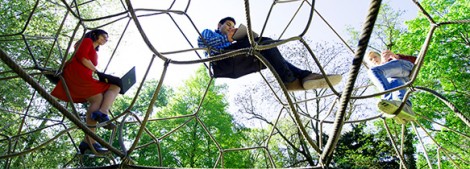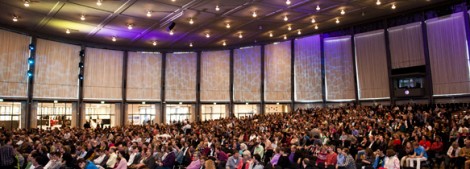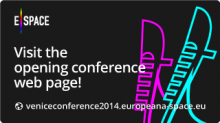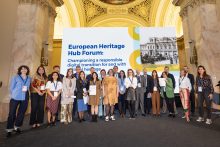
“Die Digitale Gesellschaft”, by CODIGT
While in many cases the question of which digitalia should be designated as cultural heritage worthy of archiving can only be answered with difficulty, short-term research projects have been seeking methodological solutions in science and culture, without yet having installed lasting and systematically established processes.
This symposium was devoted to the goal of raising societal awareness about the benefits of archives and archiving in the digital domain. Politicians, the public and society at large should be made aware that archiving will remain a general task in which each person can play a role. Against the backdrop of primarily economic debates, the already conspicuous consequences of the lack of digital archiving of the cultural heritage are often ignored.

“Willkommen am KIT!”
Since the founding of early states in antiquity, keeping records of historical events was a state affair. Over the centuries, the preservation of both administrative documents and works of art joined the ranks of historiography as tasks of the state. The digital media revolution of the 20th and 21st centuries has led to the restructuring of state institutions’ monopolies on archives – the relatively recent laws related to archives are a legal indication of this restructuring. In addition to this, the homogenisation of archival material through conversion into binary code has accelerated these processes. The diffusion of digital technologies within archiving practice and the rapidly growing scope of digital archives are forcing both leaders and public into action.
This symposium, organised by the Center of Digital Tradition (CODIGT) at the ZAK Centre for Cultural and General Studies of the Karlsruhe Institute of Technology (KIT), aimed to expound and promote digital archiving in particular as a cultural technology. The ZAK hopes to raise public awareness about the significance of digital archiving as a necessary precondition for the future accessibility of knowledge.
The ZAK would like to contribute to the general awareness of archiving processes and stimulate reflection on new concepts such as “crowd archiving”. The symposium provided representatives from the domains of cultural and archival work, technology, politics and science with an opportunity for interdisciplinary exchange for the purpose of developing strategies together with the public.
Themes:
– Museums, archives and the public
– Political programmes for archiving under public participation
– Digital cultural heritage and the public
– Legal guidelines for public archiving projects
About CODIGT:
The research group CODIGT (Center for Digital Tradition) is a collaborative research and
service institution located at ZAK, the Centre for Cultural and General Studies under the direction of Prof. Caroline Y. Robertson-von Trotha. Cooperation partners are Karlsruhe Institute of Technology (KIT), ZKM – The Karlsruhe Centre for Arts and Media- and the Karlsruhe University of Arts and Design (HfG).
CODIGT is dedicated to the task of contributing to the preservation of digital cultural heritage and various types of science and research data. CODIGT develops and answers questions about digitizing culture and the contextualization of digital objects within the framework of projectoriented basic research and transdisciplinary knowledge transfer. It aims to tackle issues of digital preservation (DP) as well as access to these archived objects.
Further information and contact:
Dr. Ralf Schneider
schneider@kit.edu
Website: http://www.zak.kit.edu/codigt_tagung






 If you have interesting news and events to point out in the field of digital cultural heritage, we are waiting for your contribution.
If you have interesting news and events to point out in the field of digital cultural heritage, we are waiting for your contribution.
























